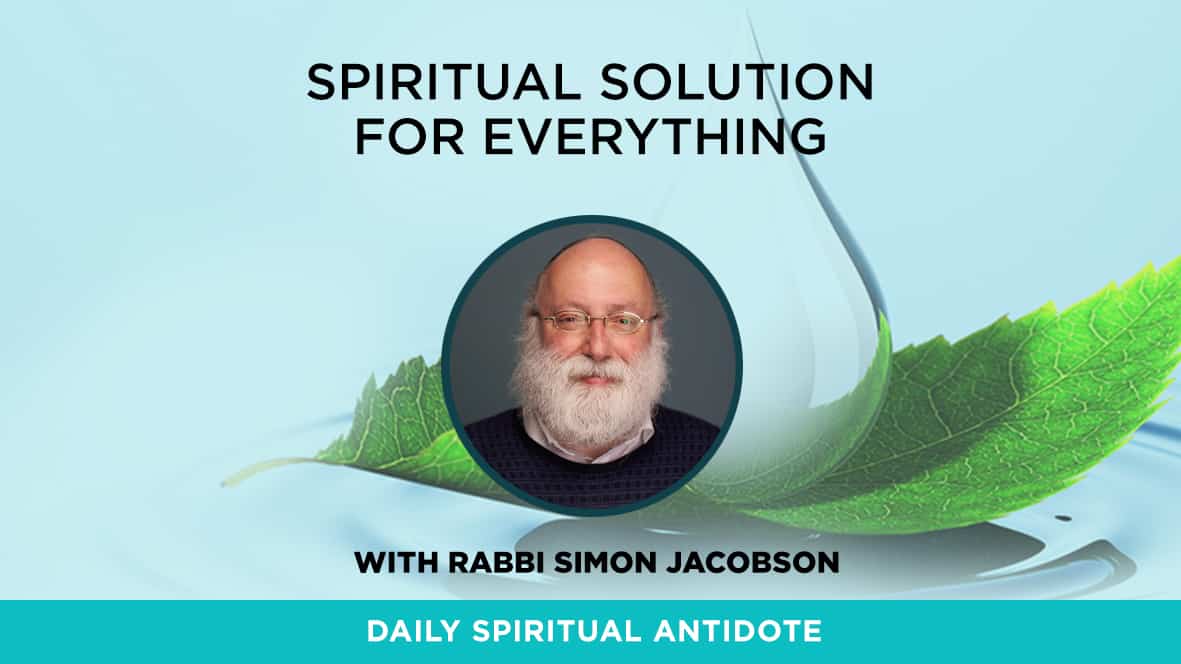by Ari Sollish
You shall set boundaries for the people roundabout [the mountain], saying: “Beware of ascending the mountain or touching its edge…”
“Bound the mountain and sanctify it.”
Exodus 19:12,23
At Sinai, for the first time, heaven and earth embraced.
For nearly 25 centuries, an invisible wall separated heaven and earth—an impenetrable barrier that guaranteed our material existence would remain intact. On the 6th of Sivan 2448, when the Torah was given, the wall disappeared and divinity descended upon the land. Through our implementation of the Divine will contained in the Torah, G-d’s primordial vision of the intimate mingling of spirit and matter could finally become a reality.
So significant is this union of spirit and matter that we are told that it was the sole intent of creation. In the words of our Sages: “G-d desired to have an abode in the lowliest of realms.”[1] Why, then, did G-d initially create a “barrier” between spirit and matter, all but precluding the possibility of realizing His ultimate desire?
Genesis
In describing the origin of creation, the “Ari”[2] states:[3]
In the beginning, a simple divine light filled the entirety of existence… When there arose in His simple will the desire to create the worlds, He contracted His light (tzimtzum), withdrawing it to the sides and leaving a void and an empty space in its center to allow for the existence of the worlds.[4] He then drew a single line of His infinite light (kav) into the void to illuminate the worlds…
In other words, before the tzimtzum, G-d’s omnipresence (the “Infinite Light”) was manifest, allowing no space for an “autonomous” reality such as ours to exist. Therefore, G-d withdrew and concealed this “light” to create the framework of our existence. Once done, he drew life into this “void” with but a single line of “light,” the finite infusion of Divine energy that vivifies our reality.
G-d’s ultimate desire, however, is that through our divine service the world should reach a state of refinement where it cannot only accommodate the finite light of the kav, but even the full measure of Infinite Light that was manifest prior to the tzimtzum and beyond. For this is the true meaning of the fusion of spirit and matter: that the physical existence of our world be capable of integrating and internalizing the spiritual energy drawn into it, eventually containing even the light that preceded creation, and indeed, initiating a “new” light that was not even manifest prior to the tzimzum.
But can this be? The very fact that the original light had to be withdrawn to allow for creation tells us that our reality cannot exist in the face of this light. How, then, can there ever be a mingling of both the Infinite Light (in its purest form) and our reality?
The secret lies in understanding the power of the tzimtzum.
The Chassidic masters explain tzimtzum by way of analogy. Before a teacher can transmit to his disciple a concept that is entirely beyond the student’s comprehension, he must first completely “erase” the concept as it exists in his own mind. Only when his own intellectual canvas is blank can he then proceed to paint the idea with completely different strokes, creating an image to which the student can relate. Once the student has integrated the concept as it was explained to him, he can then successively peel back the layers of the idea, delving deeper and deeper, until he reaches the essence of the concept —the way it first existed in the mind of the teacher.
However, if instead of first condensing the idea, the teacher transmits it in the same form as he understands it, then not only will the student not comprehend, he will become even more confused than before.
The same is true regarding the G-dly transmission of divinity into creation. Without a complete tzimtzum, the possibility of creation would not have existed.[5] Once there was a tzimtzum, however, not only is there a “space” for the worlds (to receive the finite “light” of the kav), but also, through the Torah and mitzvot, creation can be refined to the point where it can even contain the original Infinite Light and beyond.[6]
Similarly, we can understand why G-d initially created a total “barrier” between heaven and earth, leaving our world without even a hint of the divine heavenly light preceding creation, removing it only at Sinai: for the ultimate objective is that matter should contain spirit, not be obliterated by it. Thus, physicality had to initially exist unaware of spirituality, developing its own consciousness, so that when divinity finally did descend upon it, it could integrate the experience rather than being annihilated by it.
Integration
This idea also applies to the spiritual experiences we encounter: The ultimate purpose of these moments of divine inspiration is not to overwhelm us, but for them to be integrated and contained within our physical identity. Although we must constantly endeavor to renew our spiritual inspiration, we must all the while bear in mind the necessity to translate this inspiration within the mundanity of day-to-day living; for our mission is to serve G-d as “souls within a body,” spirit grounded within our persona.
Throughout our history, we find spiritual seekers struggling with the challenge of balancing a spiritual ecstatic high and their daily lives. The Torah tells the story of Nadav and Avihu, the sons of Aharon, who died when they “approached G-d,”[7] for their body could not contain the spiritual ecstasy their soul experienced.[8] The Talmud relates: “Four entered the orchard… Ben-Azai died… Ben-Zoma lost his sanity… Elisha ben Avuyah became an apostate.”[9] Only Rabbi Akiva emerged unscathed, for he “entered in peace”[10]—he initially entered cognizant of the necessity to contain and integrate the experience. The others lacked this foresight, with tragic results.
Thus, before the tremendous spiritual phenomenon of Mount Sinai, G-d told Moses to “set boundaries for the people roundabout [the mountain],” preventing the Children of Israel from “ascending the mountain” or from even “touching its edge.” For to truly benefit from the experience of Sinai, Israel had to remain far removed from the heights of spiritual ecstasy where their souls could depart from their bodies. So far removed, as to not even approach the “edge” of such ecstasy. Only then could they be sure to integrate the awesome experience of Sinai.
In our lives, too, we encounter moments of holiness, times when we may feel immensely inspired. The secret, though, is integrating spiritual experiences, bearing in mind that the ultimate purpose of such inspiration is to infuse our physical lives with this spiritual fire. Then, we not only avoid the harm that ungrounded inspiration may cause, but guarantee the infinite benefit that such inspiration spawns.
Based on an address of the Rebbe given the 3rd of Sivan, first of the Yemai Hagbolo, 5749 (1989)[11]
[1] Tanchuma Parshat Naso 16, Parshat Bechukotai 3; Bamidbar Rabba 3:6; Tanya, beginning of Chapter 36.
[2] Rabbi Isaac Luria (1534-1572).
[3] Recorded in Etz Chaim (Heichal Adam Kadmon, 1:2; Shaar HaHakdomot, 4) and Otzrot Chaim (introduction to Shaar Ha-Igulim).
[4] “However, this was not an absolute void, for there remained a residue of the divine light within the void”—Ramaz on Otzrot Chaim.
[5] Even a “limited” tzimzum that concealed the light and only left a kav would have not allowed for an independent existence, for the remaining kav would have been of the same quality and substance as the original Infinite Light.
[6] Cf. Yom Tov Shel Rosh Hashanah 5666 (1905), pg. 4.
[7] Leviticus 16:1.
[8] As Rabbi Chaim ibn Attar writes in his Ohr Hachaim commentary on Torah, theirs was “a death by Divine ‘kiss’ like that experienced by the perfectly righteous—it is only that the righteous die when the Divine ‘kiss’ approaches them, while they died by approaching it… Although they sensed their own demise, this did not prevent them from drawing near [to the Divine] in attachment, delight, delectability, fellowship, love, kiss and sweetness, to the point that their souls ceased from them.”
[9] Chagigah 14b.
[10] Ibid., 15b (as quoted in Ein Yaakov).
[11] Likkutei Sichot, vol. XXXIII, pp. 224-227.







